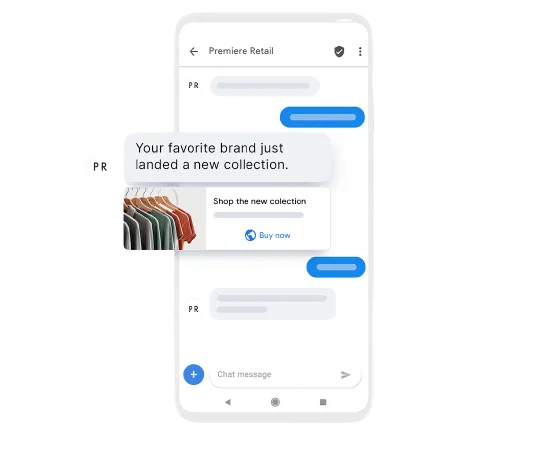We are thrilled to announce the integration of OpenAI's GPT-3 language model into the nativeMsg RCS Messaging platform, enabling our customers to take advantage of the most advanced language processing technology available.
As a leading provider of conversational messaging solutions, we understand the importance of providing natural, seamless communication experiences for our customers. With GPT-3, we can now offer unparalleled language capabilities, including natural language understanding, language generation, and machine translation.

The integration of GPT-3 into nativeMsg's platform will provide our customers with a range of benefits, including:
Improved Conversational Experiences: GPT-3 will enable our platform to understand natural language input and generate appropriate responses in real-time customized for your business, enhancing the conversational experience for end-users.
Faster Deployment: Our customers will be able to take advantage of GPT-3's pre-trained models about your business, eliminating the need for lengthy and costly training processes.
Enhanced Multilingual Support: GPT-3's machine translation capabilities will enable our platform to seamlessly translate messages into multiple languages, improving accessibility for users worldwide.
Customized Trained GPT-3 Models: Custom models offer a range of benefits to businesses, including the ability to enhance the quality of their conversational messaging experiences and improve their operational efficiency. Here are a few key benefits:
- Personalized Conversational Experiences: By training GPT-3 on a specific domain, businesses can create personalized and engaging conversational experiences for their customers. For example, a retailer could train a GPT-3 model on their product catalog and use it to provide natural language responses to customer inquiries about product features, availability, and pricing. This level of personalization can help build stronger customer relationships and improve customer satisfaction.
- Improved Efficiency: Customized trained GPT-3 models can help businesses improve their operational efficiency by automating repetitive or time-consuming tasks. For example, a financial services company could train a GPT-3 model on their customer support knowledge base and use it to provide instant responses to common customer inquiries. This can help reduce the workload for support agents and free up time for more complex issues.
- Enhanced Accuracy: By training GPT-3 on specific data sets, businesses can improve the accuracy of their language processing capabilities. For example, a healthcare provider could train a GPT-3 model on medical terminology and use it to provide natural language responses to patient inquiries about symptoms, medications, and treatment options. This can help improve the accuracy of the responses and reduce the risk of errors or misinterpretations.
Overall, customized trained GPT-3 models offer businesses a powerful tool for improving the quality of their conversational messaging experiences, automating repetitive tasks, and enhancing their operational efficiency. By leveraging the advanced language processing capabilities of GPT-3, businesses can provide more personalized and engaging conversational experiences for their customers, improving their overall satisfaction and loyalty.
Availability via the nativeMsg API
Another key benefit of integrating GPT-3 into the nativeMsg RCS Business Messaging SaaS platform is that it will be available through the nativeMsg API, allowing for easy integration into existing systems.
The nativeMsg API provides a flexible and scalable way for businesses to integrate conversational messaging capabilities into their existing applications, websites, and backend systems. With GPT-3 now available through the API, businesses can easily incorporate advanced language capabilities into their conversational messaging solutions without having to overhaul their existing technology infrastructure.
This means that businesses can take advantage of GPT-3's natural language understanding, generation, and machine translation capabilities to deliver more personalized and engaging conversational experiences for their customers, regardless of the channel they are using. Additionally, the nativeMsg API allows for real-time messaging, which means that businesses can respond to their customers in real-time, enhancing the overall user experience.
The integration of GPT-3 into the nativeMsg API will provide businesses with a range of benefits, including faster time-to-market, reduced development costs, and increased scalability. It will also enable businesses to access the most advanced conversational AI technology available, giving them a competitive edge in the marketplace.

Some Potential Use Cases for Using GPT-3 in SMS and RCS Messaging
Automated Customer Support: One key use case for GPT-3 in SMS messaging is for automating customer support. By integrating GPT-3 into an SMS-based support system, businesses can provide their customers with natural language conversations that can quickly and accurately address their needs. GPT-3 can understand and respond to a wide range of customer inquiries and issues, such as product support, billing inquiries, and account management.
Personalized Marketing: Another use case for GPT-3 in SMS messaging is for personalized marketing. With GPT-3's natural language generation capabilities, businesses can create personalized and engaging marketing messages for their customers. For example, a retail store could use GPT-3 to generate personalized promotional messages for their customers based on their past purchases or browsing history. These messages could include tailored product recommendations, exclusive offers, or event invitations.
Language Translation: A third use case for GPT-3 in SMS messaging is for language translation. With GPT-3's machine translation capabilities, businesses can easily translate SMS messages between different languages, improving accessibility for users worldwide. This could be particularly useful for businesses that operate in multiple countries or have a diverse customer base. By providing SMS messaging in a user's preferred language, businesses can improve customer satisfaction and engagement.
These are just a few examples of how GPT-3 can be used in SMS messaging. With its advanced language processing capabilities, GPT-3 opens up a range of possibilities for businesses looking to provide more engaging and personalized conversational experiences for their customers.
We are excited about the possibilities that this integration will bring to our customers and the broader conversational messaging industry. As the demand for conversational AI solutions continues to grow, we are committed to providing our customers with the most advanced technology available.
At nativeMsg, we pride ourselves on being at the forefront of innovation in the messaging space. With GPT-3, we are taking another step forward in delivering the best conversational experiences to our customers. We look forward to seeing the impact that this integration will have on the industry and our customers.
If you're interested in learning more about the GPT-3 integration into the nativeMsg RCS Messaging SaaS platform, please visit our website or contact our sales team. We're excited to see the impact that this integration will have on the industry and our customers, and we look forward to hearing from you!

